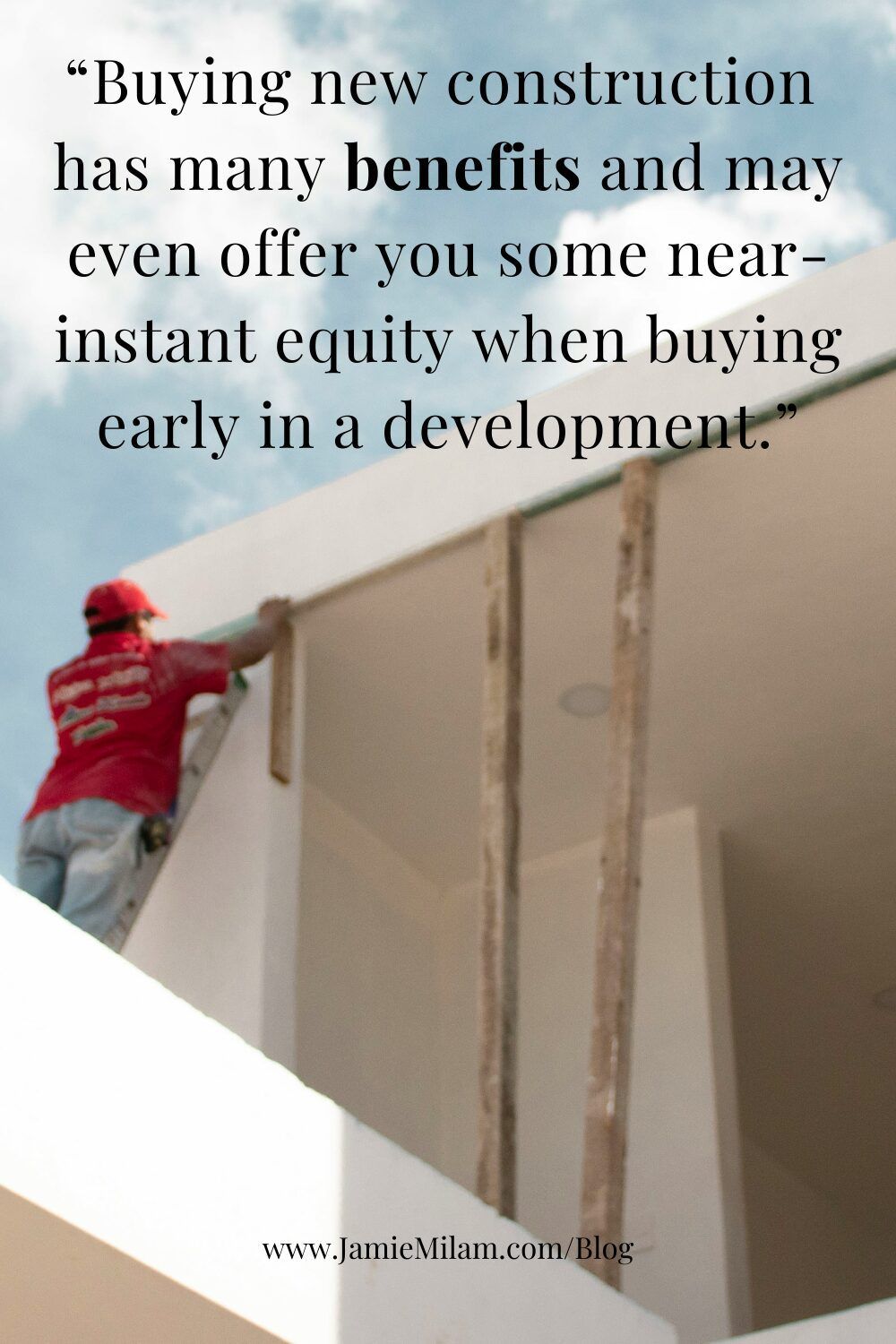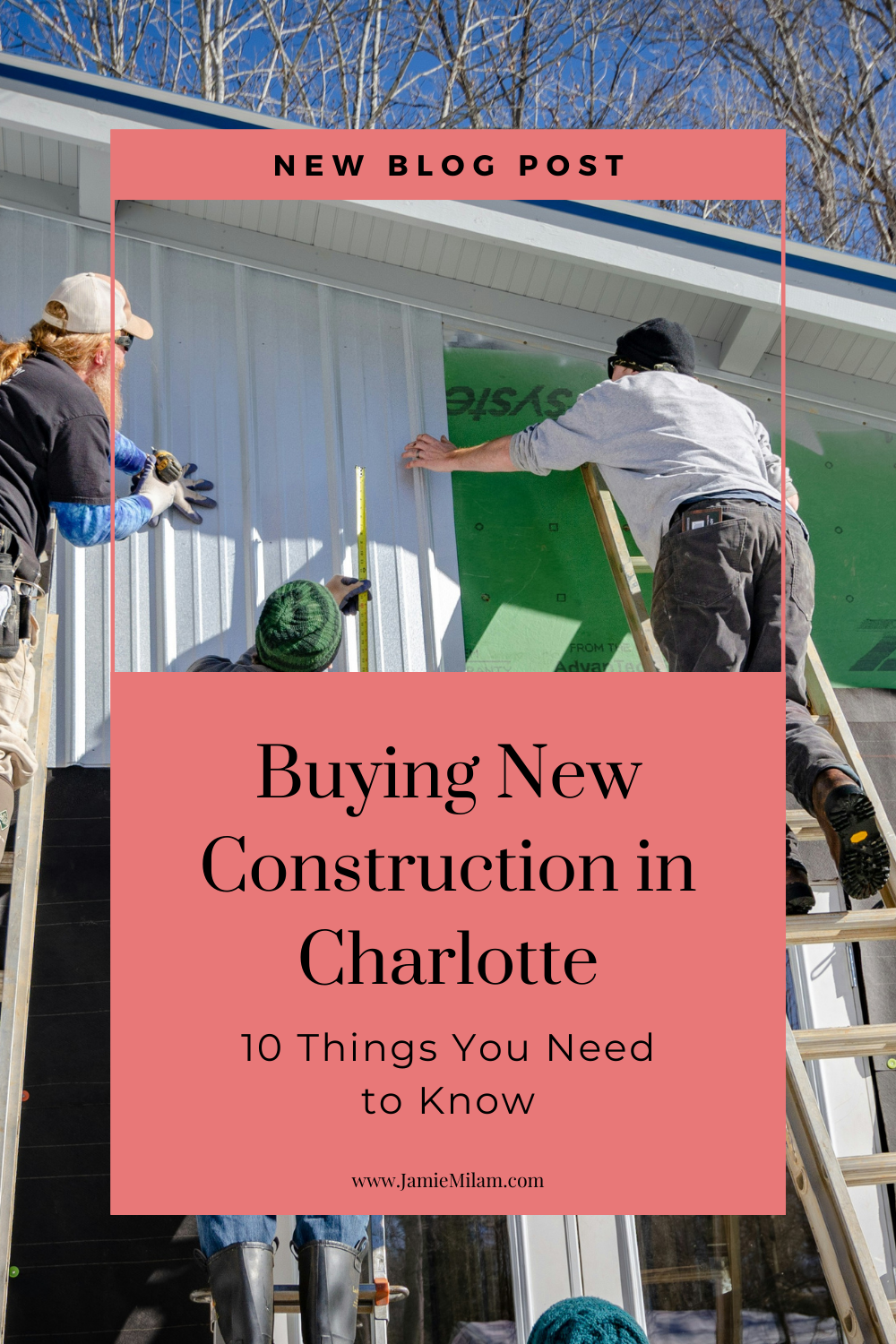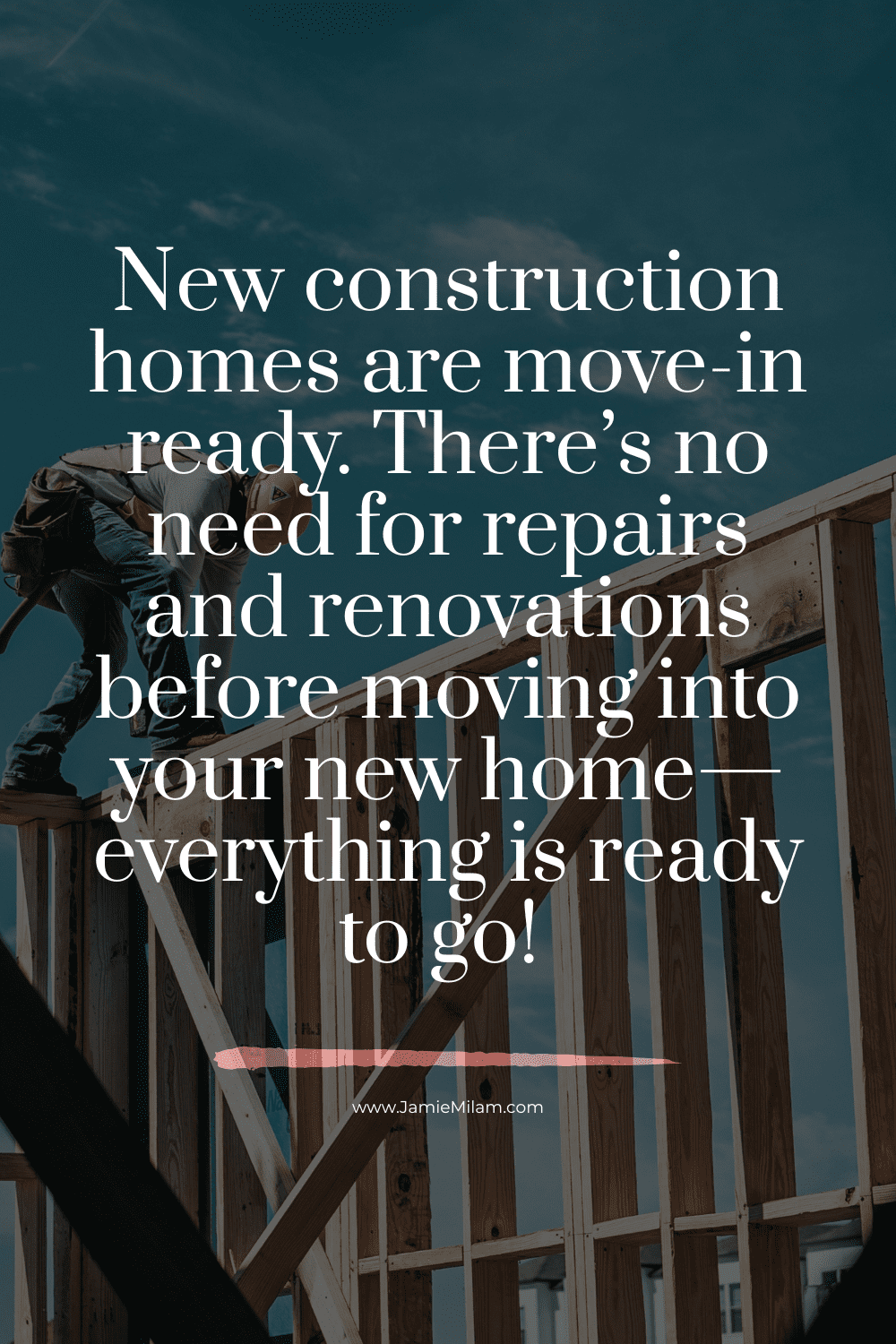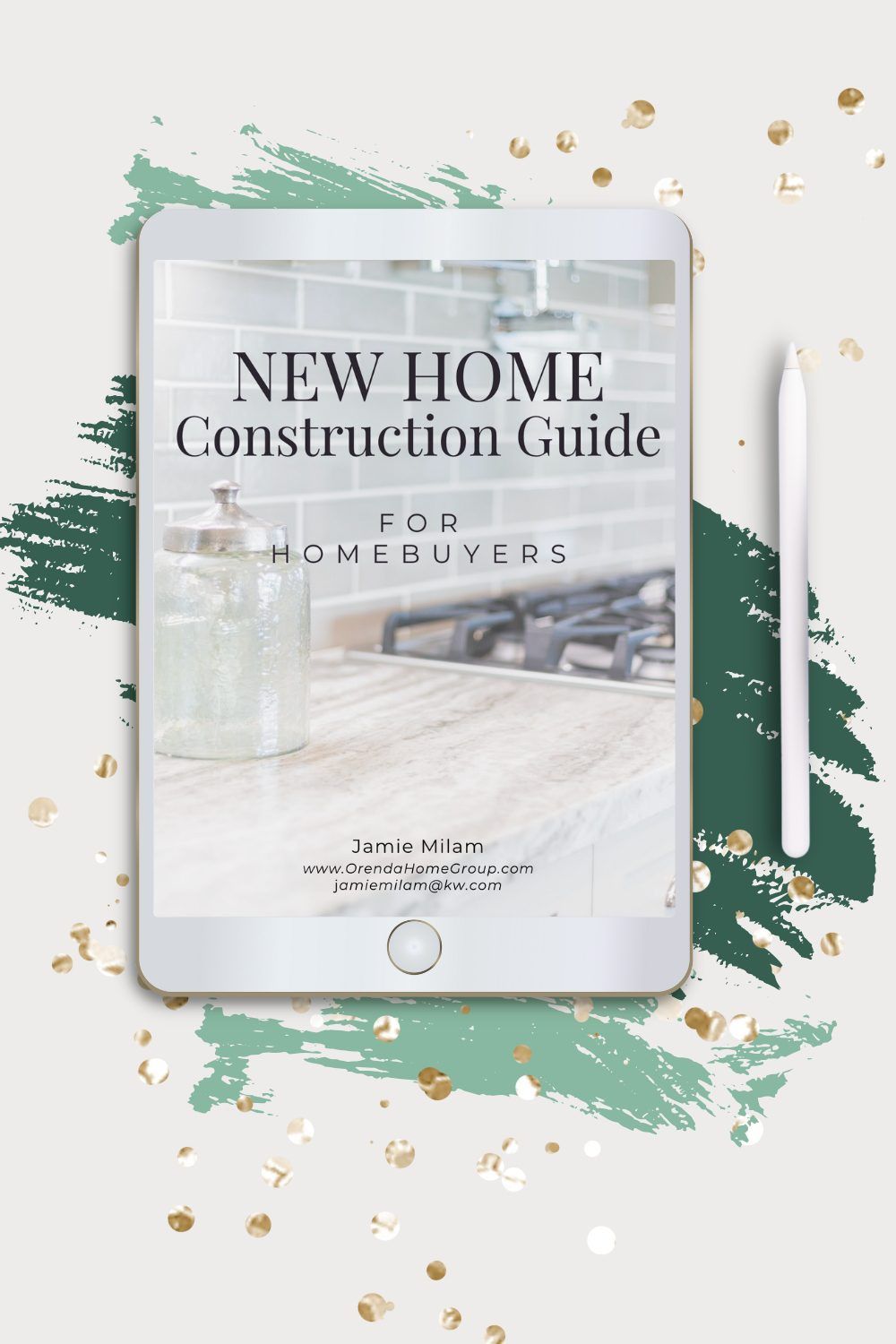THE BLOG
THE BLOG
*This website uses affiliate links which may earn a commission at no additional cost to you. As an Amazon addict and Associate, I earn from qualifying purchases, but I'm only recommending products I love!
Browse More Blog Posts:

Buying New Construction in Charlotte: 10 Things You Need to Know
Author: Jamie Milam
Date: April 17, 2025
So, you're considering moving to the Queen City? Excellent choice.
Between an affordable cost of living, convenient location, and a thriving cultural scene (we have awesome sports and live music options!), Charlotte is a great city to purchase a home for first-time and long-term buyers alike.
The city is growing and developing quickly, which means new construction homes are an exciting option for many prospective buyers. It certainly was for me! I bought my own primary home as new construction and would do it again.
Buying new construction has many benefits and may even offer you some near-instant equity when buying early in a development. I have many clients who have only ever purchased new construction, and then I have some who find it a bit overwhelming. Either way, having an experienced real estate consultant by your side to advise you every step of the way will help put you at ease knowing they have your best interest in mind.
First, we'll look at the different options for buying a new construction home in Charlotte and then dive into the 10 things you need to know before jumping into finding your dream house.
Understanding New Construction Options in Charlotte
First things first—just what is a "new construction" home? Simply put, it's a home that no one has lived in before; you are the first owner and inhabitant after construction. This contrasts with a "resale home," where someone else has owned and lived in the property.
With that distinction in mind, there are three types of new construction options:
1. Spec (or inventory) homes
These are homes a builder constructs without a specific buyer under contract to purchase it yet. They can be standalone houses, condos, duplexes, or other types of housing, and developers often are building more than one at a time. We see this often when you have one-off builders (not the big national brands) constructing a property or when it's a heavy seller's market with very little inventory.
Spec and inventory homes are usually nearly completed when buyers purchase them, making it possible to move in fairly quickly. While some customization may be an option, most floor plans and finishes are set.
- Best for: Spec and inventory homes are good for buyers looking to move in quickly, who want something new but don't need a lot of customization, and are seeking budget-friendly options.
2. To-be-built homes
This next category of new construction options in Charlotte refers to houses where the buyer chooses a floor plan from the builder's available designs and the specific lot within their development that they'd like to home to be placed on. Unlike the spec and inventory homes, construction begins after a contract is formed, so it is typically a much longer time before you can move in (between 6-12 months, depending on the builder).

This type of new construction allows for some level of customization (i.e., room type, covered porches, flooring, or cabinets), but there are minimal structural changes as you choose from pre-set options.
- Best for: To-be-built homes are best for buyers with a longer timeframe and who want some customization without the expense of a full custom build.
3. Full custom homes
Offering the most flexibility and choice for the buyer, full custom homes are designed from scratch with an architect or builder. Buyers have complete control over every aspect of the home—layout, materials, features, and finishes.
This process is usually the longest and most expensive of the three, as buyers need to also acquire a parcel of land to build on and the customization requires more labor, materials, and design time.
- Best for: Full custom homes are best for buyers with a specific vision for their home and who want complete control over the design; they have longer timeframes and bigger budgets.
Depending on your needs, budget, and timeframe, these options have a number of new construction home benefits:
- Move-in ready: No need for repairs and renovations before moving into your new home—everything is ready to go!
- Customization options: Depending on the option, there is often some level of customization available to you to make your ideal home.
- Lower maintenance and repairs: Because everything is new, your major mechanicals (roof, plumbing, HVAC, etc.) have a longer lifespan from the start of your ownership.
- Planned communities and amenities: Many new construction neighborhoods also have planned amenities like parks, pools, trails, etc.
- Energy efficiency: New construction homes in Charlotte must adhere to modern energy codes, which means there is better insulation, efficient HVAC systems, and lower utility bills than older, pre-owned homes.
10 Things You Need to Know When Buying New Construction in Charlotte
Buying new construction in Charlotte can be a great option for many prospective buyers. As you start conversations with your Charlotte real estate agent, here are the 10 things you need to know before starting the process.
1. Home Options
As outlined earlier, there are a few different types of new construction homes in Charlotte. It's important that you find a real estate agent who not only knows what's available in the market, but also what would be an appropriate fit for your needs, timelines, goals, and budget.
2. Representation
When buying a home, new construction or otherwise, you want a real estate agent who represents you and your interests. Sales agents and contractors represent the builder (i.e., the seller), and while they are knowledgeable about the new construction project (ahem, as they should be, right?!), they aren't necessarily representing your interests.
Most builders require you to register your agent with them so they can offer any compensation to your agent on your behalf. If you have an agent assisting you in the process of buying a home, it's best you let your Realtor® know which community/builder you're interested in and let them register for you before visiting the sales center rather than registering online or in sales centers for new communities to avoid that risk.
In the event that you experience a builder telling you that they won't offer compensation to your agent, that doesn't mean you can't still have representation (it's your legal right), it just means you'll have to pay for your agent's service fee in full at the closing table. Save yourself the dollars by communicating with your agent every step of the way!

3. Lot Premium
You may see communities mention a "lot premium." The base price you see advertised on the builder's website typically does not include the price of the lot you choose. The premiums for those lots can vary depending on their location within the community. The larger the lot and the more privacy the lot has, the higher the lot premium will be.
Again, you want to work with a real estate agent who understands the ins and outs here and can help you make the right choice and may be able to negotiate that on your behalf.
4. Financials
Money, money, money... It's a huge consideration when buying a home—of course. When it comes to new construction in Charlotte, here's what you have to consider:
- Deposits are non-refundable and often are much higher than the traditional resale options of North Carolina due diligence fees (also non-refundable) and earnest money deposits. Deposits for new construction can be anywhere from $15-60K+, or a percentage of the purchase price.
- Pricing: It's not uncommon to see builders increase their base pricing on a monthly basis. In the resale world, you tend to see homes drop in price the longer they sit on the market, but with new construction, the builder adjusts the price to account for their holding costs, increase in materials, and following the market trends in buyer demand.
- Build-out Cost: Unless it is a spec home, the advertised price is often the base price, which excludes any structural options you may select or your design style options. I advise my clients to expect to spend about 10-15% of the base price in structural options and another 10% in design selections. For example, the floor plan you like doesn't show the sunroom like the model home does. You can add on the sunroom, but it will be a structural option upgrade and will add a cost to the base pricing. Same with aspects like adding soft-shut drawers in the kitchen or cabinets in the laundry room.
- Incentives: Many builders offer incentives to buyers, such as interest rate buy-downs, discounted upgrades, rebates, closing cost assistance, and more. It's becoming more and more common to see those incentives directly related to using their in-house lender only, but it may be a separate special offer that they're running. This is another reason it's important to work with a knowledgeable Charlotte real estate agent who understands and can help secure builder incentives. Plus, you never know when an agent may have just worked in the community last month and can try to secure some of that "expired" discount rate.
- Contingencies: Builders are going to do what they can to minimize their risk, meaning they're going to require purchase contracts with little to no contingencies on the buyer side. They'll require that you provide your pre-approval letter or proof of funds at the time you submit your offer and may even request that you apply with their in-house lender to verify qualification, even if you don't plan to use their lender. If you have a home to sell in order to fully qualify for the purchase of the completed home, new construction typically will have restrictions and timelines around this that may not fit your goals.


5. Structure and Design
Again, depending on the type of new construction home, you may be able to make minor to significant choices regarding both the structure and design of your home.
- Structural options include: Changing the front elevation of the home, optional office or other specialty rooms, covered or screened-in porch, an additional garage, tray or coffered ceilings, room layouts, finished third floor or basement, expanding the bathroom, etc. This is anything that may change the floor plan, framing, or foundation of the home.
- Design options include: Hard and soft finishes like flooring, cabinets, countertops, lighting, and hardware. This is anything that doesn't touch the floor plan, framing, or foundation, but focuses more on aesthetic and functional elements.
Note that national builders like Pulte, Taylor Morrison, Toll Brothers, or M/I Homes, just to name a few, have pre-determined design packages or levels for you to choose from. This can be very helpful if it's your first time building a home, because an open catalog of options makes it more difficult (and overwhelming!) to choose and can create delays in the timelines.
Full-service custom builders (e.g., Gerrard Builders, Simonini, Pike Properties, Arcadia) will work with you to allow you to hand-select your finishes and fixtures. They'll often have an in-house design team or partner with an interior designer to assist you in putting together your full design plan. With both builder types, you'll likely incur change order fees, but you'll be more limited to what you can change—and when—with the national builders.
6. Standard vs. Upgrades
When it comes to the design finishes, features, and layout, you'll hear them called a "standard feature" or an "optional upgrade." Any time I'm walking a model home with my client, I'll often be pointing out aspects that are likely an upgrade so they can expect that to add to the overall cost of the home. A few common examples would be extra recessed lighting, large patio slider doors, a free-standing tub, built-in bookshelves next to the fireplace, and more.
Your "standard features" are what's included in the base price of the home. From there, you'll have levels to choose from for quality of finishes like flooring, cabinets, countertops, lighting, and hardware. So if you love those trendy navy cabinets they are showcasing in the kitchen island, you can expect those cabinets to be an "optional upgrade" and come at a higher price than whatever the standard level one cabinets are.
Most model homes are built to showcase higher-level options to highlight how luxurious it can really be. While you may be drawn in by that, it's important to note that those finishes are not the standard level and will incur higher costs as an upgrade.
7. Inspections
Even though new construction homes are, well, new, inspections are still important! I highly recommend investing in at least two inspections: a third-party pre-drywall inspection and a final inspection. The first lets you take advantage of seeing behind the walls to evaluate the construction before insulation and drywall go up.
An inspection will look at things like I-joists that have been cut into, warped studs that can create bowed walls, broken attic trusses, or slipped gusset plates—these are all things I see in pre-drywall inspections (and then some!) and want to bring to the builder's attention to get them to cover the cost of repairs and provide the sign off on them.
Those broken trusses are the big one that really get me. I see them far too often. In fact, have only ever had one without them. A site manager may try to tell you, "that's normal," but my argument is that the only thing "normal" about it is that it happens often, but your home isn't meant to have them! In fact, a licensed structural engineer is the only person who can provide the proper instructions on how to remedy them. Without some written verification of it, you may face potential costs down the road when you go to sell the property and your buyer gets an inspection that points these things out.
- Pro tip: Take a video of your home before the drywall goes up. This makes a great reference point later to the plumbing and electrical behind the walls. Take a slow walk through with video and talk yourself through each of the rooms as a guide to proximity and what is what. It'll be much easier to know what areas of walls to avoid when you go to decorate or want to make changes in your home that may require a contractor. You certainly don't want to drive a nail straight through your plumbing pipe!
It's the same with final inspections—you need one to ensure the builder hasn't cut any corners before you take ownership. I've been at more than one final home orientation and detected a gas leak (just by smell) to bring to the builder's attention before closing. You'd be surprised at what can come up!
Once you close on your new construction home, everything is your issue and expense now. Even if there is a builder home warranty, they don't cover everything so it'd be much easier to get them to fix any issues prior to you taking ownership of it. Get those inspections!
8. HOA Rules
Many new construction communities have HOA (homeowner associations) with monthly or annual fees. It's important to know what those fees are and what they include. There are also often rules regarding landscaping, exterior changes, and short-term rentals that homebuyers need to understand before purchasing in an HOA.
Additionally, many new communities have something called a capital contribution fee, and every buyer who purchases has to pay this one-time fee at closing. This contribution fee is essentially funding the start of your HOA reserve funds. This is especially helpful for communities with amenities (pool, clubhouse, playgrounds, etc.) or that have townhomes within the development.
The reserve fund is a way to ensure that when the time comes for maintenance or repair, there are funds available to pull from rather than having to propose a special assessment for the homeowners to agree on and approve.
9. Timelines and Delays
It's important to know and prepare for delays and extended timelines—they're a reality with new construction homes. Since these homes do not exist yet like a resale house, they're impacted by anything from weather to supply chain issues to labor shortages. Even spec and inventory homes that are nearly complete can be subject to last-minute delays.
The builder can estimate the month that the home is aiming to be completed by and share that with you at the time you contract with them to purchase it. However, you often will not know a specific, target closing date until your cabinets are being installed in the home.
For this reason, it's important that you have some flexibility in your timeline if you're buying a new construction home. If you absolutely must move in by a certain day, you need to be wary about choosing to buy a new-build. Again, consult with your Realtor® and be realistic about the timeline you need to operate on.
10. Warranties & Care
New constructions have a huge advantage over resales because they come with builder and manufacturer warranties. It's important to register for any available warranties—including those covering your appliances—when you close on your home. This ensures that any issues you run into can be addressed and covered by the builders and manufacturers rather than paying out-of-pocket.
Keep in mind, even though you have these warranties, you'll still want to make sure you're scheduling regular maintenance on your AC and furnace to keep them running efficiently and maximizing their lifespan. Having service records will also help you if you do end up needing to file a claim.
One thing I like to recommend to all of my clients when they purchase a new home with stone countertops is to have it sealed. Granite, quartz, and marble are all porous and should actually be sealed to prevent liquid absorption that can cause staining. The builder does not include this process, so you should take measures to have that done once you close on your new home. I also recommend having any tiled shower floors sealed as well to protect against moisture, dirt, and mildew buildup. It also makes cleaning easier and extends the lifespan of your tiles.
Along those same lines, make sure you follow the guidance for your lawn care immediately following move-in. Watering your new sod will help your grass actually take root and offer a healthier looking lawn. This is something that usually is not included in your builder's warranty and can be a big cost to have to replace down the road, or risk it being quite an eyesore.
There we have it—10 things you need to know before buying new construction in Charlotte and maybe anywhere in the US. There can be a lot of decisions to make, but it doesn't have to be overwhelming. These considerations will help make your home-buying process smoother and ensure you end up with your dream home. Be sure to download your free copy of my New Construction Guide!
If you're looking for a Charlotte-based real estate agent to partner with you in this, let's talk and get you started on finding the right community for you!
To buying new construction!

Save this post to come back to or share with a friend!

About Me
I'm Jamie Milam, a determined AF woman who's embraced life after divorce by finding peace through self-awareness, intentional decision-making, and thrilling new travel adventures.
As a Realtor® in Charlotte, NC (and your connection to top agents nationwide), I’m passionate about guiding you through your homeownership and design goals—while also helping you create space for the things you love. My mission is to empower you to create a life of alignment too - at home, abroad, and within.
Whether it’s through real estate tips, home design inspiration, or solo travel experiences for divorced, independent women, I hope this space encourages you to discover deeper self-awareness and build a life that aligns with your passions and needs.
Have you scoped the podcast series that empowers women to make aligned decisions in a divorce?

Your Free Charlotte City Guide

Jamie Milam is a Realtor® in the Charlotte, NC area, licensed in both NC & SC, and has the ability to refer you to a number of agent partners across the nation, regardless of where you may live. She is an enthusiast for the power of awareness and believes it can be used in all facets of life to support aligned living.
**Disclosure** This post may contain affiliate links and they are at no additional cost to you, though I may earn a small commission. Don't worry, I only recommend products or services that I have tried or believe would be of great value to you! All opinions expressed are those of my own!
Recent Posts
There's More ▾
There's More ▾
Let me share the goods!
Come from contribution, that's a motto I've valued for years! So... that's exactly what I am to provide you, straight into your inbox each week! No fluff and all open-book. Inspiring you to practice awareness, value your authentic self, and implement strategic actions so you can create alignment in your world to live the life you desire and deserve!










